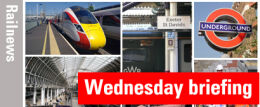Posted 9th February 2022 | 1 Comment
Reward offered after train driver was injured by brick

Reward offered after train driver was injured by brick
A reward of £1,000 has been offered by Northern to achieve a conviction after a brick was thrown at a train travelling on the Manchester-Bolton line near Clifton at 22.00 on Friday night. Broken glass from the windscreen hit the driver's face. The driver was taken to hospital, but is now continuing to recover at home. Northern regional director Chris Jackson said: 'It’s hard to believe that anyone would put the safety of others at risk by such reckless behaviour. The consequences of a brick hitting a fast-moving train are potentially devastating. This was a shocking incident that could have had fatal consequences.' British Transport Police are investigating.
Strikes set to start on TransPennine Express
Conductors on Transpennine Express who are members of the RMT are due to start a series of four 24-hour Sunday strikes from 13 February. TPE said it was 'extremely disappointed with the decision of RMT, which will not only disrupt journeys but also comes at a time when the rail industry – alongside much of the nation – continues to feel the impact of the coronavirus pandemic.' The dispute is reported to be about rest day and Sunday working and payments for using new technology.
c2c apologises for overcharging passengers
c2c has apologised for inadvertently increasing some fares since Saturday because incorrect prices were loaded into the ticketing system. The operator is inviting passengers who think they were overcharged to apply for refunds. Examples of the accidental increases include a return to London Fenchurch Street rising from £19.40 to £21.10, and a return to West Ham costing £15.20 instead of £14.60.
Train operators must focus 'relentlessly' on performance
The latest survey carried out by Transport Focus has found that 85 per cent of railway passengers were satisfied with their journeys in a recent week. The key factors are still punctuality and reliability, followed by the amount of crowding on the train. Higher satisfaction figures have been given by commuters, because peak hour trains are not as busy as they were before the pandemic. But satisfaction with value for money is still lower than the other benchmarks, at 63 per cent.
ScotRail confirms end of reduced timetable
ScotRail's temporarily reduced timetable, which was introduced in early January because of staff shortages caused by Covid, will end on Monday. The operator said more than 450 staff had been absent during the worst period, which was why services had to be reduced. Although about 150 staff are still off sick, including 50 drivers, ScotRail is restoring the service levels which were provided in December, with about 2,000 services running daily.
New building for future Elizabeth Line station
A new station building has opened at Burnham on the line to Reading, which is set to become an Elizabeth Line station by June. A more spacious ticket office building has an accessible ticket window, new ticket vending machines, automatic ticket gates and screens showing live travel information. At platform level, the existing canopy has been cleaned, repaired and redecorated, while the toilets have been completely refurbished.
Reader Comments:
Views expressed in submitted comments are that of the author, and not necessarily shared by Railnews.

Stewart Prentice, Newcastle-under-Lyme
On hearing the reports of the collision between passenger trains at Salisbury Tunnel Junction in October last year my initial thought was - 'where is the flank protection'? The signal SPAD'd, SY31, protects a conflict point ahead of the converging routes into Fisherton Tunnel. I am sure the RAIB will ask why no flank protection was afforded to this signal, thereby derailing the SPAD train (or dragging into sand) before reaching the conflict point - and in the case colliding with the converging train.
However my question to the RAIB would be to consider if DVRS (Double Variable Rate Sanders) could have prevented this incident. DVRS may have provided some assurance as to achieving the full service and emergency brake demanded by the Driver and TPWS, and in doing so prevented not only the SPAD but more importantly the collision.